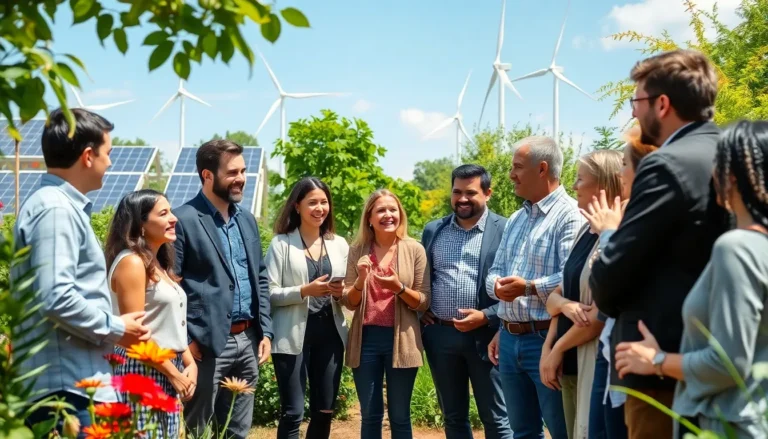In today’s fast-paced office environment, waste can pile up faster than a mountain of unfiled paperwork. From coffee cups to discarded printouts, it’s easy to overlook the impact of daily habits on the planet. But what if reducing waste at work could not only save the Earth but also boost morale and productivity? Imagine a workplace that’s not just eco-friendly but also a little more fun.
Embracing waste reduction isn’t just a noble cause; it’s a smart business move. Employees love working in a space that values sustainability, and it can even save companies a pretty penny. So, why not swap out those single-use items for reusable ones and turn trash into treasure? Let’s explore some simple yet effective strategies to make the office greener, one paperclip at a time.
Table of Contents
ToggleImportance Of Waste Reduction At Work
Waste reduction significantly impacts workplace sustainability. Organizations benefit from decreased disposal costs and less reliance on landfills. Transitioning to sustainable practices fosters a healthier environment. Enhanced employee morale stems from a commitment to eco-friendly initiatives. Productivity often improves when workers feel engaged in sustainability efforts.
Implementing waste reduction strategies can reduce operational expenses by 20% to 30%, according to the Environmental Protection Agency. Another study shows that companies adopting green practices see an increase in employee satisfaction and retention. Effective measures include reducing paper usage by going digital and implementing recycling programs.
Additionally, switching from single-use to reusable items decreases resource consumption. It’s crucial to educate staff about responsible waste management practices, as awareness leads to behavioral changes. Many offices experience reduced waste generation through regular training sessions and informative workshops.
Waste reduction aligns with corporate social responsibility, enhancing brand reputation and attracting environmentally conscious clients. Prioritizing sustainability demonstrates ethical leadership, which resonates with both employees and customers. Together, these outcomes create a competitive advantage in today’s market.
Organizations that prioritize waste reduction at work gain both environmental and economic benefits. Adopting a proactive approach to waste management strengthens workplace culture and contributes positively to the planet.
Strategies For Waste Reduction
Effective strategies for waste reduction enhance sustainability in the workplace. Organizations can adopt various approaches to minimize waste impact.
Implementing Recycling Programs
Creating comprehensive recycling programs encourages staff participation in waste reduction. Employees know the importance of placing recyclable materials like paper, plastic, and glass in designated bins. Providing clear labels helps eliminate confusion regarding what can and cannot be recycled. Regular workshops promote recycling awareness and address common misconceptions. Some companies report a reduction in waste disposal costs by up to 30% when efficient recycling programs are in place. Monitoring the recycling rates allows for continuous improvement in these initiatives, fostering a culture of sustainability.
Encouraging Digital Documentation
Transitioning to digital documentation significantly reduces paper consumption. Organizations benefit from utilizing cloud storage and digital tools for collaboration, which minimizes the need for printed materials. Training staff on document management software enhances efficiency and organization. Emphasizing the advantages of digital alternatives not only cuts costs but also streamlines workflow. Companies that focus on reducing paper usage often see operational expense reductions between 20% to 30%, aligning with broader sustainability goals. Promoting less printing reinforces a commitment to eco-friendly practices while improving productivity.
Engaging Employees In Waste Reduction
Engaging employees in waste reduction fosters a proactive culture around sustainability. It cultivates awareness and encourages participation across the organization.
Training And Workshops
Training sessions provide essential insights into waste reduction strategies. Regular workshops can focus on practical tips for minimizing waste while encouraging collaboration among team members. Employees perform better when they understand how to implement recycling practices effectively. Incorporating engaging activities enhances retention of information during these sessions. Clear guidelines on waste management streamline efforts, allowing staff to see tangible results. Feedback from participants often leads to improved training materials, ensuring relevance and efficacy. Workshops can also feature guest speakers who specialize in sustainability, further enriching the experience.
Incentives For Participation
Incentives motivate employees to actively engage in waste reduction initiatives. Implementing reward systems for teams demonstrating exceptional recycling behaviors strengthens commitment. Consider organizing competitions that encourage friendly rivalry among departments to reduce waste levels. Gift cards, additional time off, or recognition programs can greatly enhance participation rates. Employees appreciate tangible rewards for their contributions, fostering a sense of community and shared responsibility. Tracking progress through informative dashboards keeps everyone updated on goals and achievements. As incentives create a positive feedback loop, they help build a culture that values sustainability within the workplace.
Measuring Success In Waste Reduction
Organizations can measure success in waste reduction through specific metrics and analytics. Tracking waste diversion rates offers a timely overview of how much waste is recycled or composted versus sent to landfills. The introduction of digital monitoring tools streamlines this process, allowing for real-time data collection.
Assessing operational expenses provides insight into financial benefits realized through waste reduction initiatives. Companies can compare waste management costs before and after implementing new strategies, often noting a reduction of 20% to 30%. This financial evaluation supports the case for continued investment in eco-friendly practices.
Employee engagement also plays a crucial role in success measurement. Regular surveys can gauge staff participation in waste reduction programs and their attitudes towards sustainable practices. Organizations reporting higher engagement often see improvements in morale and productivity, reinforcing the relationship between responsible waste management and employee satisfaction.
Setting clear goals enhances the effectiveness of waste reduction efforts. Establishing specific targets encourages accountability among employees and management. For example, aiming for a 30% reduction in paper usage within a year sets a tangible benchmark for the team to strive towards.
Data visualization through dashboards can enhance awareness and motivation. Displaying current waste metrics in common areas encourages friendly competition among departments. Teams that meet waste reduction goals can be recognized, boosting collective efforts and reinforcing the organization’s commitment to sustainability.
Investments in training and workshops reflect positively on waste reduction outcomes. Regularly educating staff about effective waste management practices fosters a culture of participation. Companies that prioritize continuous learning often experience sustained improvements in waste metrics and employee involvement.
Embracing waste reduction at work is more than just a trend; it’s a vital step toward a sustainable future. By fostering a culture of responsibility and engagement, organizations can significantly reduce their environmental impact while enhancing employee satisfaction.
Implementing practical strategies like recycling programs and digital documentation not only cuts costs but also boosts productivity. Educating staff and encouraging participation creates a sense of ownership and accountability.
As businesses prioritize eco-friendly practices, they not only contribute to a healthier planet but also position themselves as leaders in corporate social responsibility. The journey toward waste reduction is a collective effort that ultimately benefits everyone involved.






